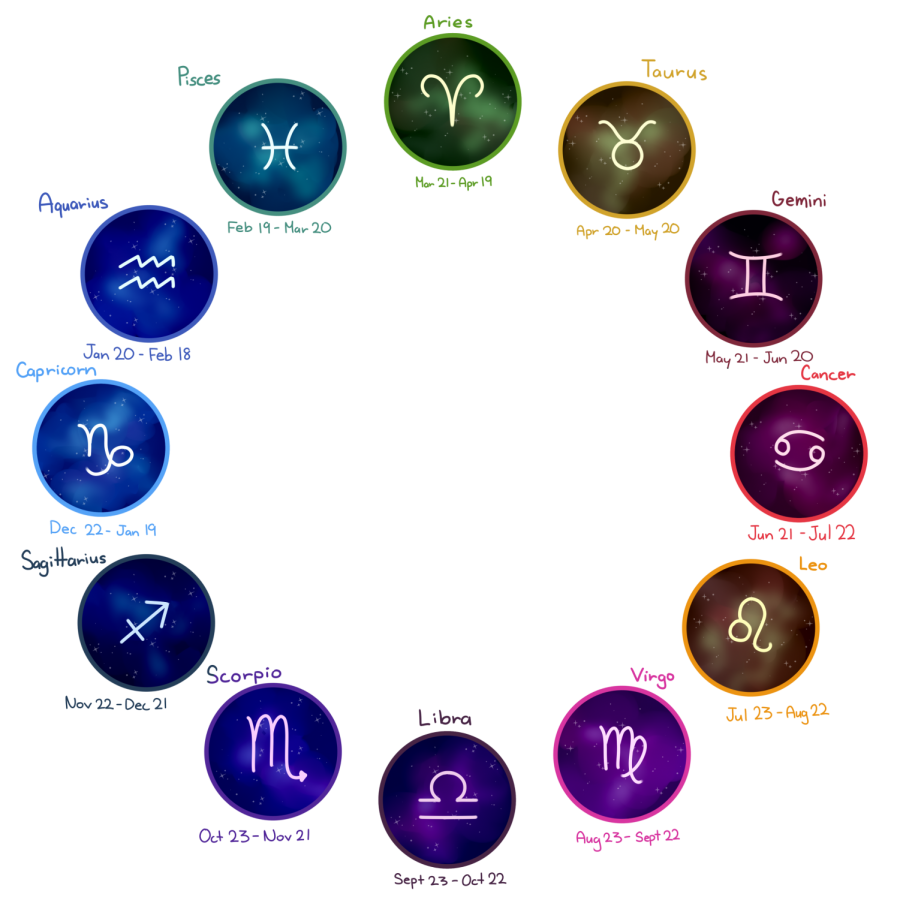Written in the Stars
Astrology in the Age of Uncertainty
October 27, 2021
Has anyone ever said “you’re such a Scorpio!” But the second you hear it, you think “how can someone buy into this nonsense?” Guilty! Personally, I can’t take astrological predictions seriously when they’re on TikTok.
These days, people are always trying to guess what zodiac you are, but when they’re wrong, they’ll say “well, you seem like such a Gemini.”
Everywhere you turn, whether that’s TikTok or Snapchat, someone is telling you about yourself based on a zodiac sign. You might think that it’s all crap, or you might believe that there is some truth behind the science, but either way, the new resurgence in astrology in popular culture may be credited to the apocalypse we call 2020.
In the height of a pandemic when nothing was certain, it is no surprise that many people turned to the stars for hope, causing a revival of astrology.
For believers, the new followers of the pseudoscience only added to the excitement of the practice. “Having more people to share this with makes it more worth it,” said junior Aarushi Gulati, a follower of astrology.
Gulati and her friends who’ve been into astrology for years think that while the practice was placed on the backburner since the 70’s, it certainly wasn’t forgotten. After all, certain times can lead to new beliefs.
“Under conditions of high stress, the individual is prepared to use astrology as a coping device even though under low-stress conditions he does not believe in it.” psychologist Graham Tyson said to The Atlantic in an article called “The New Age of Astrology”.
Having the internet to spread information faster than before only helped the practice take foothold with today’s young people.
“Astrology expresses complex ideas about personality, life cycles, and relationship patterns through the shorthand of the planets and zodiac symbols,” Julie Beck, a reporter for The Atlantic wrote in the previously mentioned article. And that shorthand works well online, where symbols and shorthand are often baked into communication.”
But burgeoning interest in astrology doesn’t mean that everyone has abandoned rationality. There are still many people who criticize astrology as fake, misleading information. Frankly, while I do see why some people follow astrology so seriously, a part of me thinks that the stars can’t possibly tell you your future.
Did you know there are videos out on the internet that tell you your soulmate based purely on your zodiac sign? How can an entire group of people born in the same 45 to 50 day frame have the same soulmate? Or how can all of our soulmates’ names start with the letter ‘D’?
Initially, I was confused by this too- I knew there had to be more to it. After a bit of research I now know all of that is not really what astrology is about, but when this is the type of stuff that gets talked about and goes trending, a majority group will think that is what true astrology is.
The concept of astrology isn’t fake, but it has been convoluted by modern media and psychology. Modern astrology, or what we see in the media, is closer to social psychology than it is to what ancient astrology used to be: the practice of reading the stars.
“We need to learn the language of the doctors of that time and be a little less dismissive so we can learn a little more from them,” microbiologist Freya Harrison told The Quartz.
Astrology is exactly what they say it is; a practice. It is only kept alive through use. That being said, while it is important to learn from the practices of our ancestors, it is also important to remember that some practices became outdated for a reason. There is a fine line between practicing astrology the right way, and completely ignoring in favor of modern science. Maybe the answer is to meet in the middle. Will compromising teach us more than choosing one side over the other?



